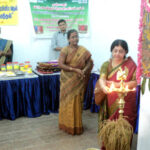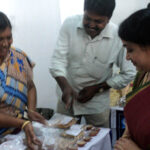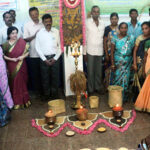Organic food is becoming very popular nowadays. Scientists are emphasizing the use of organic products in daily routine. But we common people might still have some questions like, Why organic food? Is organic food really healthier?
Is it more nutritious? Why is it so expensive?
The exhibition cum sale held at C.P Arts Centre, Alwarpet on Feb. 26 and 27 organised by National Bank For Agriculture and Rural Development (NABARD) and Centre for Indian Knowledge System (CIKS) gave the answers.
Mrs. Lalitha Venkatesan, CGM of NABARD inaugurated by lighting the kuththuvillakku. There were 15 stalls exhibiting varieties of organic agricultural, handloom, handicraft and medicinal products. Homemade snacks and vadams by women self help groups from various villages were one among them.
Mrs. Subashini, Program director of CIKS explained the methods and need for organic agriculture.
“Pesticides that are used in conventional agriculture pollute our agro fields and their residues remain on the food we eat. The health hazards caused by them are very dangerous and hence the use of organic techniques in farming becomes the need of the hour.”
“Organic agriculture is fully dependent on our ancient traditional farming techniques and so the crops grown are natural and healthy to consume. The crops are grown without the use of harmful artificial fertilizers and hence the nutritious content of the crops is well preserved. But the farm yield in organic agriculture is less compared to inorganic agriculture and this is the reason for the high price of organic food”, she added.
Reducing the use and consumption of polythene bags is important. Jute and cloth bags can be used as good alternatives. Handmade cloth bags from old sarees, waste cloth and newspaper bags were available for sale.
A wide range of traditional varieties of rice, grown by employing organic farming techniques, special snacks made from healthy food grains grown on organic farms , a large collection of pickles and millet based products were exhibited.
Various horticulture, apiculture, vermiculture and sericulture products like pure Wild honey, cashews, medicinal products, herbal plants, natural silk sarees, cotton sarees, towels and vermicompost were sold.
Books on organic agriculture methods, preserving our traditional crop varieties, roof gardening, vermiculture and many other useful books on farming were a part of the exhibition.



